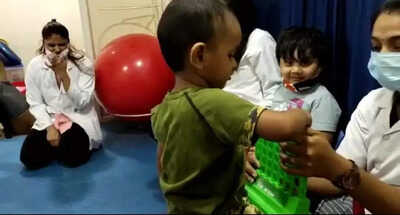Home is the new hub of psychological problems
Times of Bennett | Updated: Feb 01, 2022 17:40

By VAIDEHI SHAH
NEW DELHI: The pandemic has not only hit teenagers and elders with depression and anxiety but also children. “It is not the wave of corona; it is the wave ofpsychological disorders ,” pediatrician Ruchi Kapoor said.
She attributed this epidemic ofmental health to the fact that the school was online and children were not allowed to go out and play or meet their friends due to which they felt trapped and frustrated.
“Shut out from the outside world physically, they tried to seek it out virtually, taking out their frustration on phone, laptop and through video games. The use of electronic gadgets increased which made them addicts to electronic gadgets. They started to spend less time with family even when all of them were at home,” she explained.
This should not taken as a ‘phase’ because it has affected children physically and mentally, she added. More and more children, are falling into depression, anxiety,bipolar dependent personality disorder . “I’ve had a lot of cases wherein children showed withdrawal symptoms when denied electronic gadgets,” says Kapoor.
“Anger, tension, depression, irritability and restlessness have increased in the younger lot due to which they have sudden outbursts, these are some of the common symptoms,” Kapoor added.
Take the case of two-year-old Ayaan Maheshwari who showed signs of autistic tendencies due to over exposure of electronic gadgets during the pandemic to keep him occupied when his parents worked from home. Many children who lost their loved ones tried to deny reality and divert their mind through prolonged screen time, causing more damage to their health. “In this pandemic, home which was once the safe corner of the world for the children, became the hub of psychological issues,” child psychologist, Geeta Hiteshi said.
Worldwide, 10 percent of children and adolescents experience mental disorders, but most of them do not seek help or receive care. Half of allmental health conditions start by 14 years of age. Suicide is the third leading cause of death in 15 to 19-year-olds. “The consequences of not addressing mental health and psycho-social development of children and adolescents extend to adulthood and limit opportunities for leading fulfilling lives,” Kapoor said.
According to one study, 46,000 children between the ages of 10 and 19 commit suicide annually. To solve such issues, children should be taken to a child psychologist for counseling and parents should spend quality time with them. Children should be encouraged to play games which do not involve electronics items, Kapoor said.
NEW DELHI: The pandemic has not only hit teenagers and elders with depression and anxiety but also children. “It is not the wave of corona; it is the wave of
She attributed this epidemic of
“Shut out from the outside world physically, they tried to seek it out virtually, taking out their frustration on phone, laptop and through video games. The use of electronic gadgets increased which made them addicts to electronic gadgets. They started to spend less time with family even when all of them were at home,” she explained.
This should not taken as a ‘phase’ because it has affected children physically and mentally, she added. More and more children, are falling into depression, anxiety,
“Anger, tension, depression, irritability and restlessness have increased in the younger lot due to which they have sudden outbursts, these are some of the common symptoms,” Kapoor added.
Take the case of two-year-old Ayaan Maheshwari who showed signs of autistic tendencies due to over exposure of electronic gadgets during the pandemic to keep him occupied when his parents worked from home. Many children who lost their loved ones tried to deny reality and divert their mind through prolonged screen time, causing more damage to their health. “In this pandemic, home which was once the safe corner of the world for the children, became the hub of psychological issues,” child psychologist, Geeta Hiteshi said.
Worldwide, 10 percent of children and adolescents experience mental disorders, but most of them do not seek help or receive care. Half of all
According to one study, 46,000 children between the ages of 10 and 19 commit suicide annually. To solve such issues, children should be taken to a child psychologist for counseling and parents should spend quality time with them. Children should be encouraged to play games which do not involve electronics items, Kapoor said.











